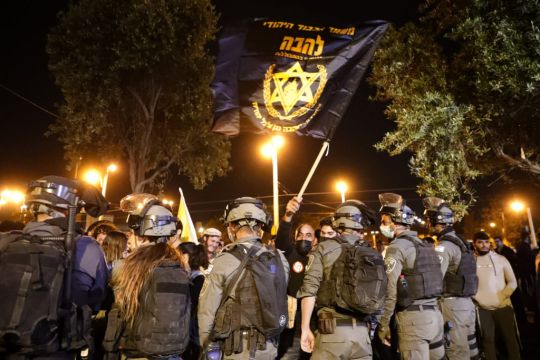A total of 44 people have been arrested and 20 Israeli police officers were injured on a night of chaos in Jerusalem, as security forces clashed with Palestinians angry about Ramadan restrictions and Jewish extremists who held an anti-Arab march nearby.
Tensions have risen in recent days in Jerusalem, which has long been a flashpoint in the Israeli-Palestinian conflict, and is home to holy sites sacred to Jews, Christians and Muslims.
Residents braced for possible further unrest ahead of Muslim Friday prayers as police stepped up security measures.

Palestinians have clashed with Israeli police on a nightly basis since the start of the Muslim holy month of Ramadan.
The tensions began when police placed barricades outside the Old City’s Damascus Gate, where Muslims traditionally gather to enjoy the evening after the daytime fast.
Later on Thursday, hundreds of Palestinians hurled stones and bottles at police, who fired water cannon and stun grenades to disperse them.

Dozens of Palestinians were injured during the unrest.
Meanwhile, a far-right Jewish group known as Lahava led a march of hundreds of protesters chanting “Arabs get out” toward the Damascus Gate.
The show of force came in response to videos circulated on TikTok showing Palestinians slapping religious Jews at random. Other videos made in response to them appear to show Jews assaulting Arabs.
Police used metal barricades to halt the far-right protesters a few hundred yards from Damascus Gate.

Later, they used water cannon, stun grenades and mounted police to push them back toward mostly Jewish west Jerusalem.
Videos circulated online showed smaller clashes and fires elsewhere in the city.
One video showed what appeared to be a group of Palestinians beating an ultra-Orthodox Jew near Damascus Gate.
They could be seen punching, kicking and throwing the man to the ground before police chased them off.

The police statement did not specify whether those arrested were Palestinian or Jewish and did not refer to any specific instances of violence.
Israel captured east Jerusalem in the 1967 war and annexed it in a move not recognised by most of the international community.
The Palestinians want east Jerusalem to be the capital of their future state. Its fate has been one of the most divisive issues in the peace process, which ground to a halt more than a decade ago.

Thousands of Palestinians were expected to attend weekly prayers at the Al-Aqsa mosque compound in Jerusalem’s Old City later on Friday.
The site is the third holiest in Islam and the holiest for Jews, who refer to it as the Temple Mount.
The sprawling hilltop holy site has been the scene of clashes on a number of occasions over the years, and was the epicentre of the 2000 Palestinian intifada, or uprising.







